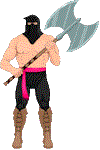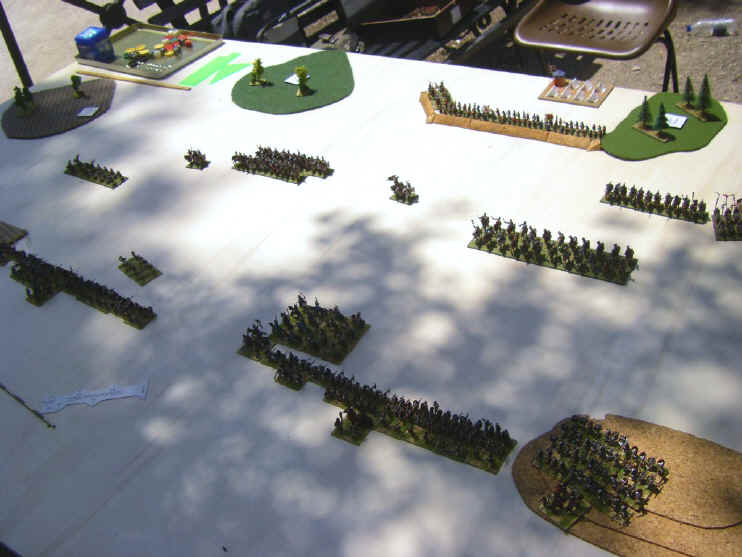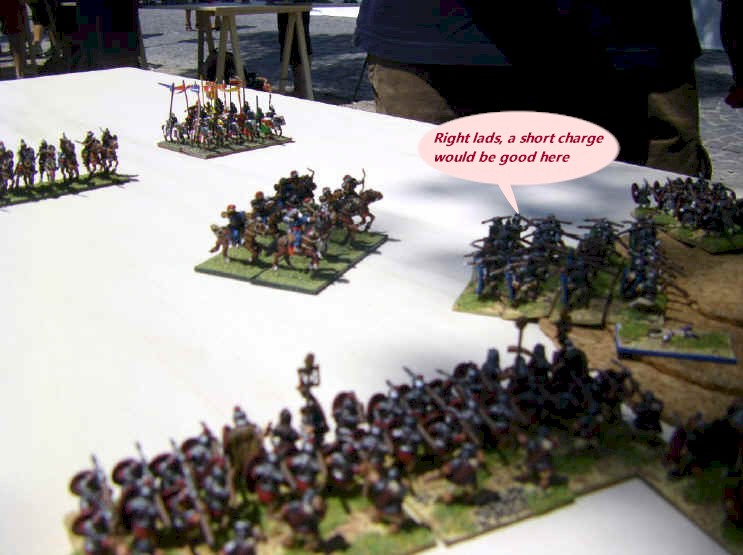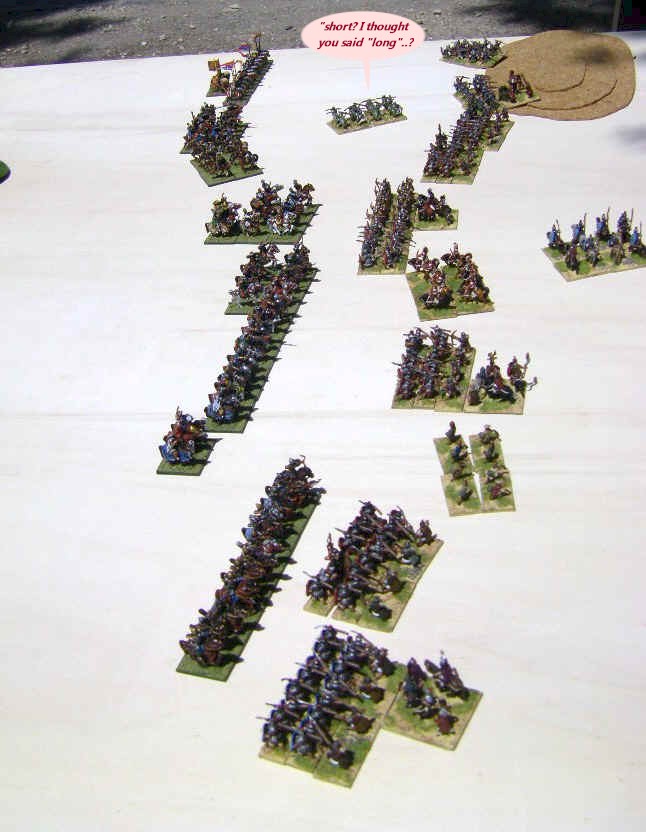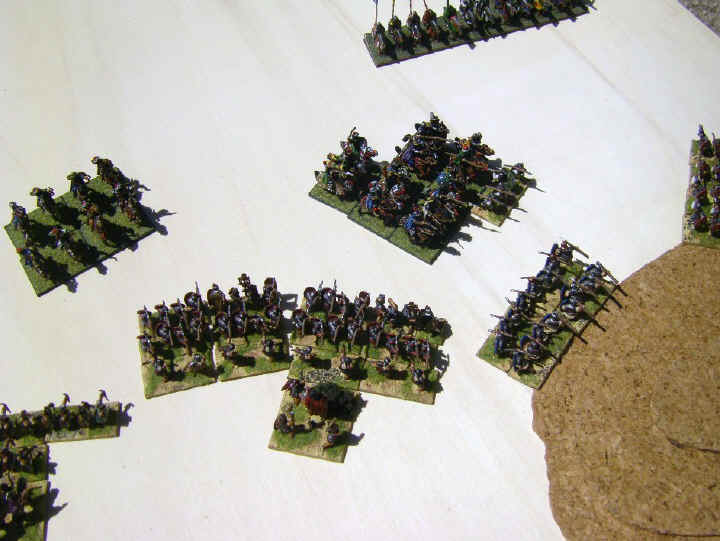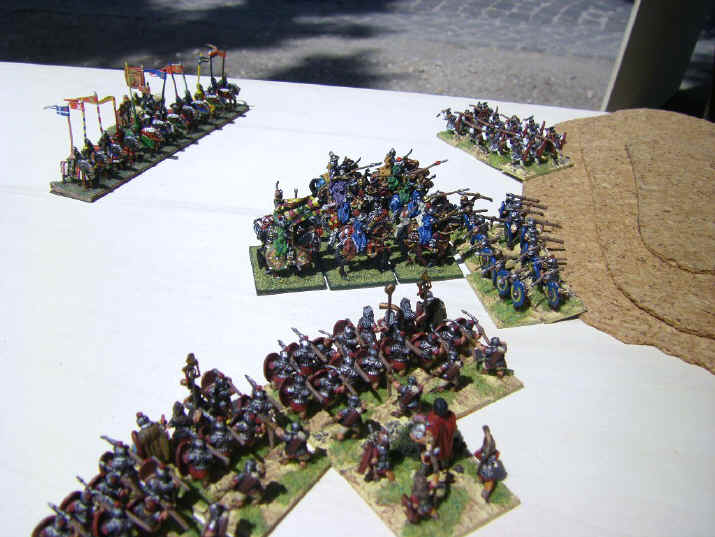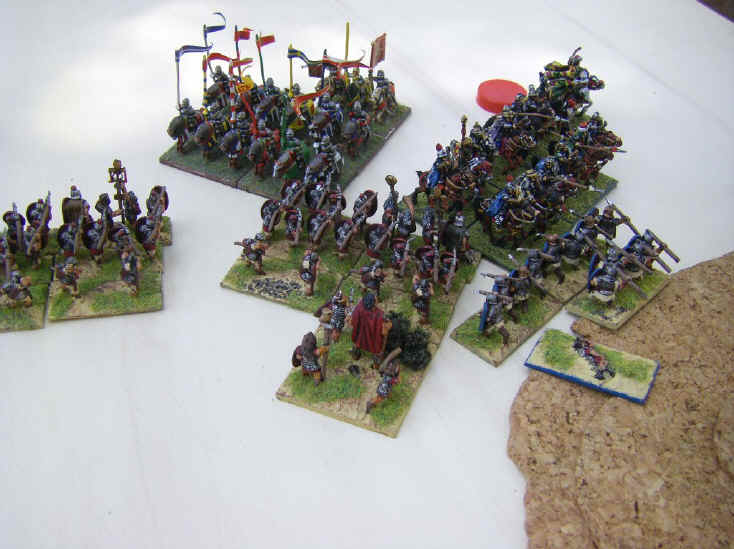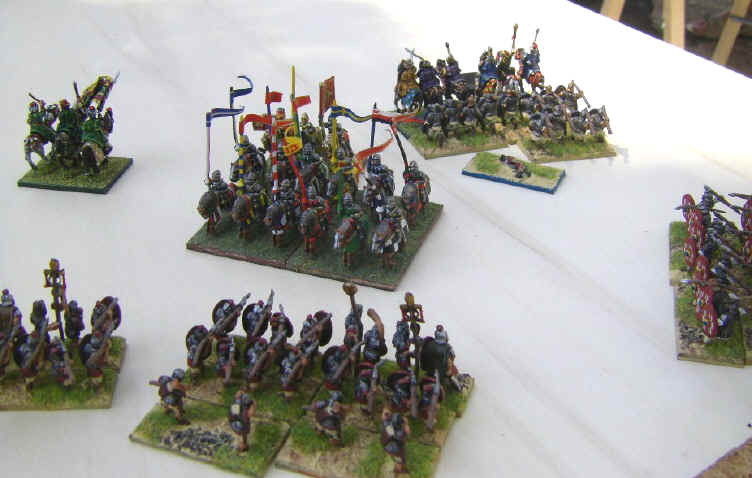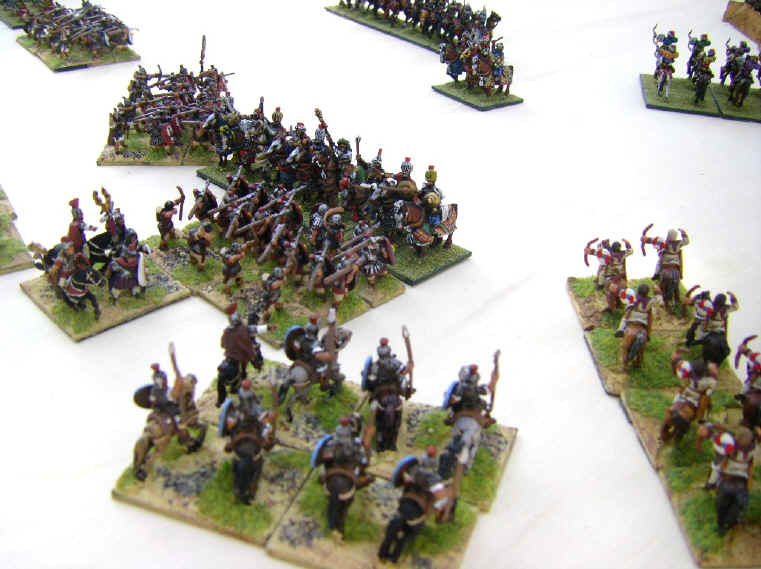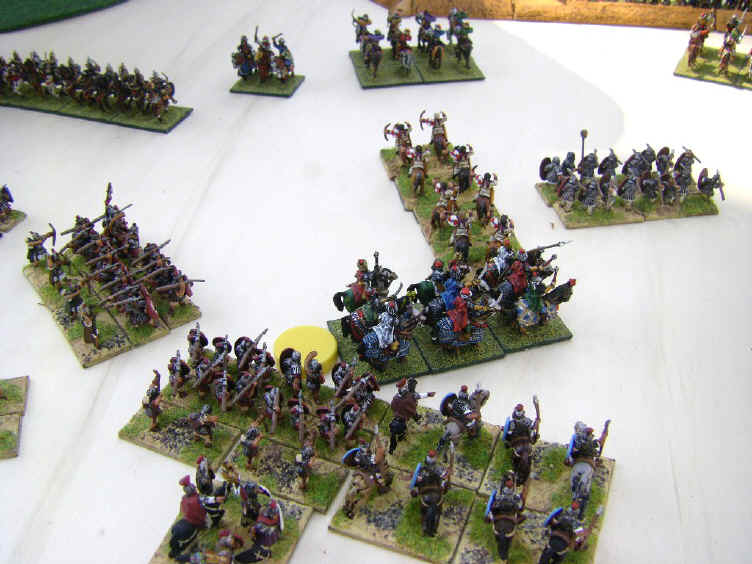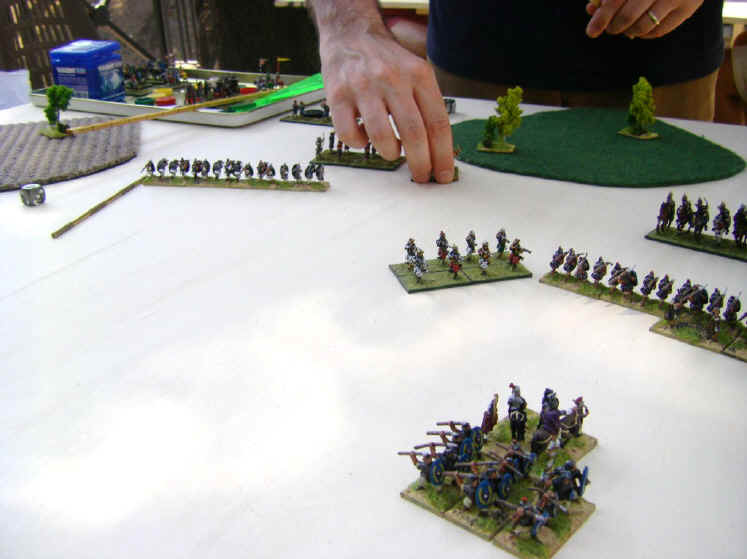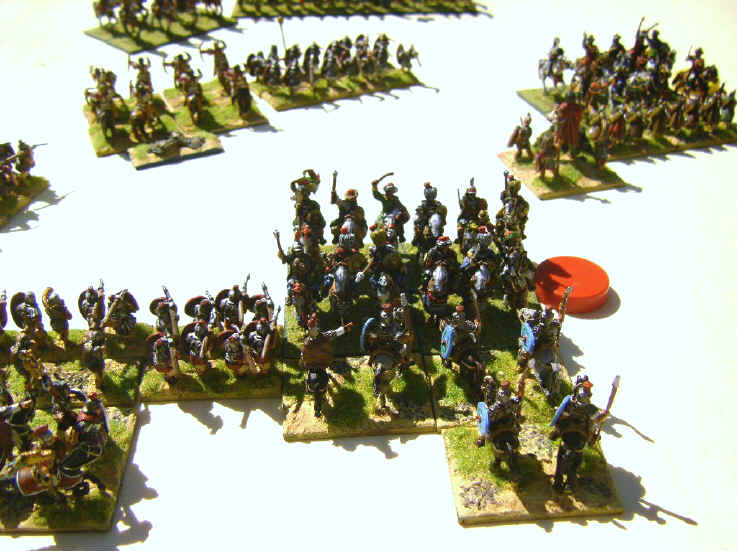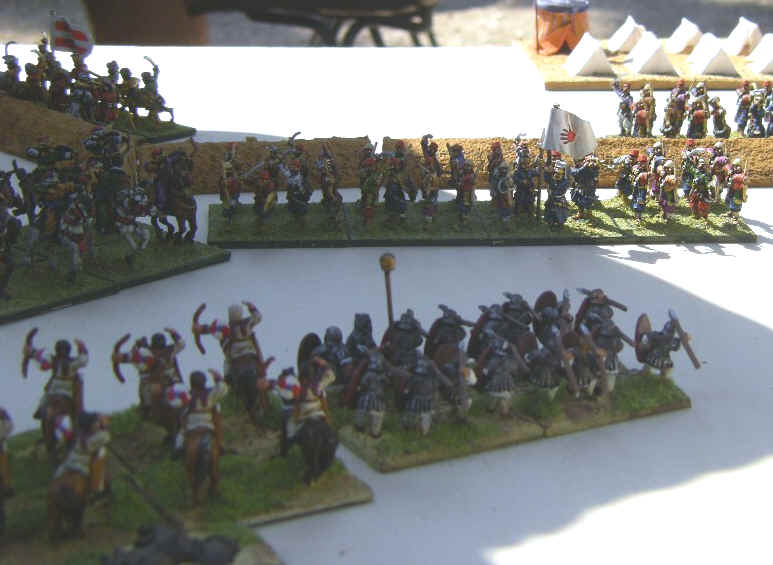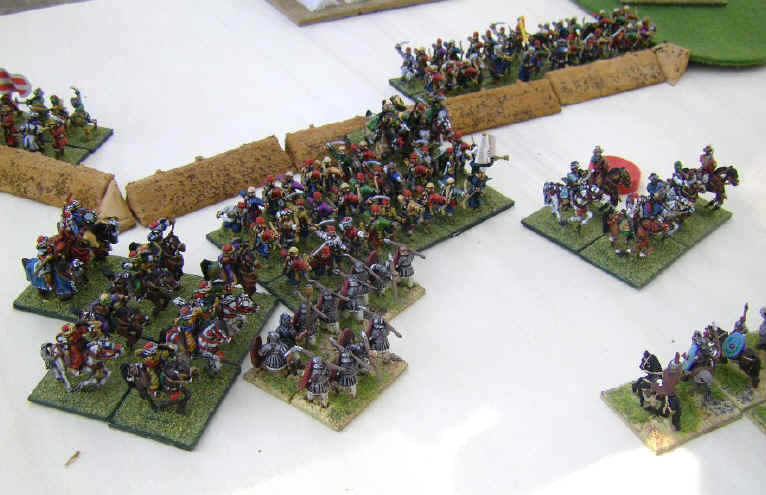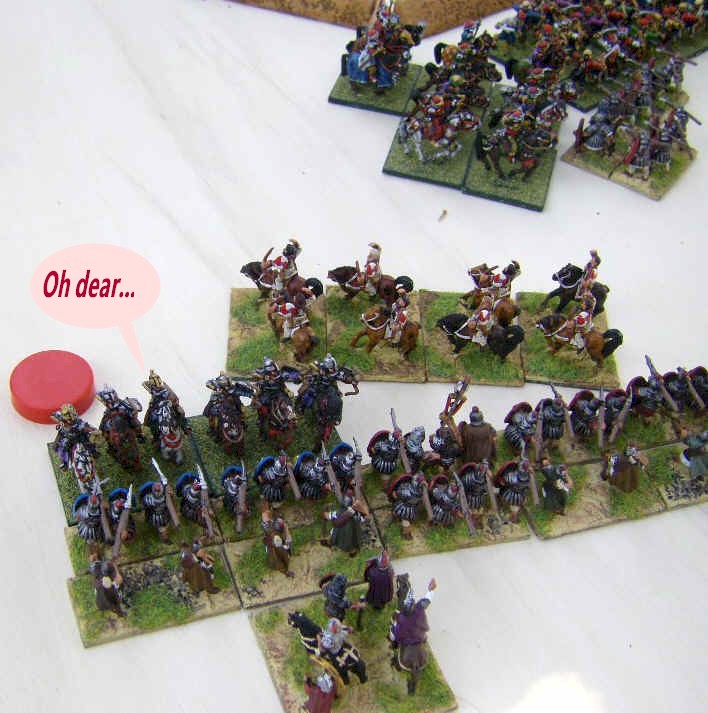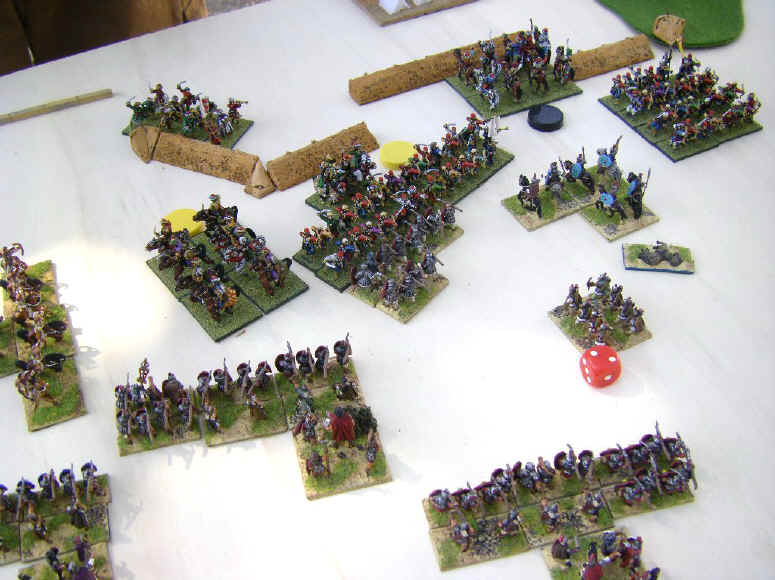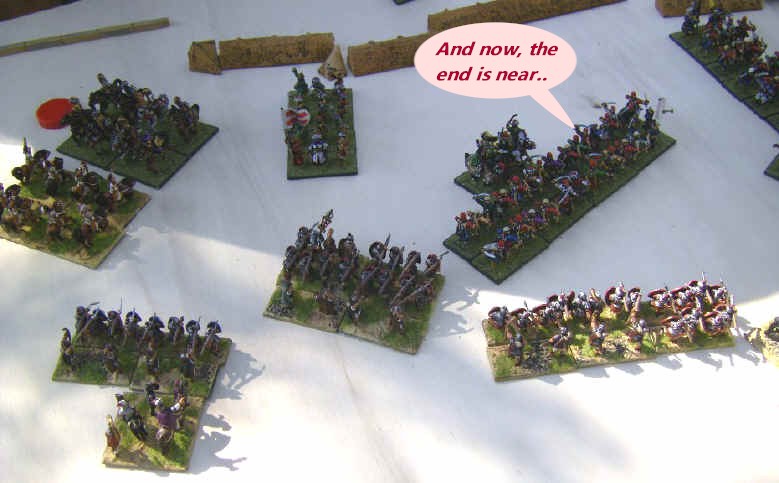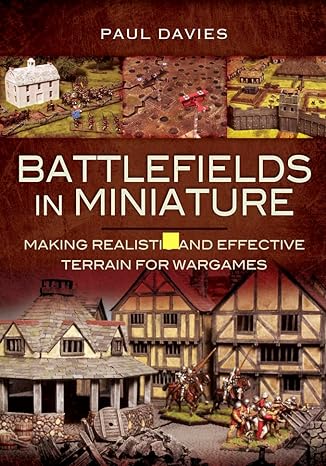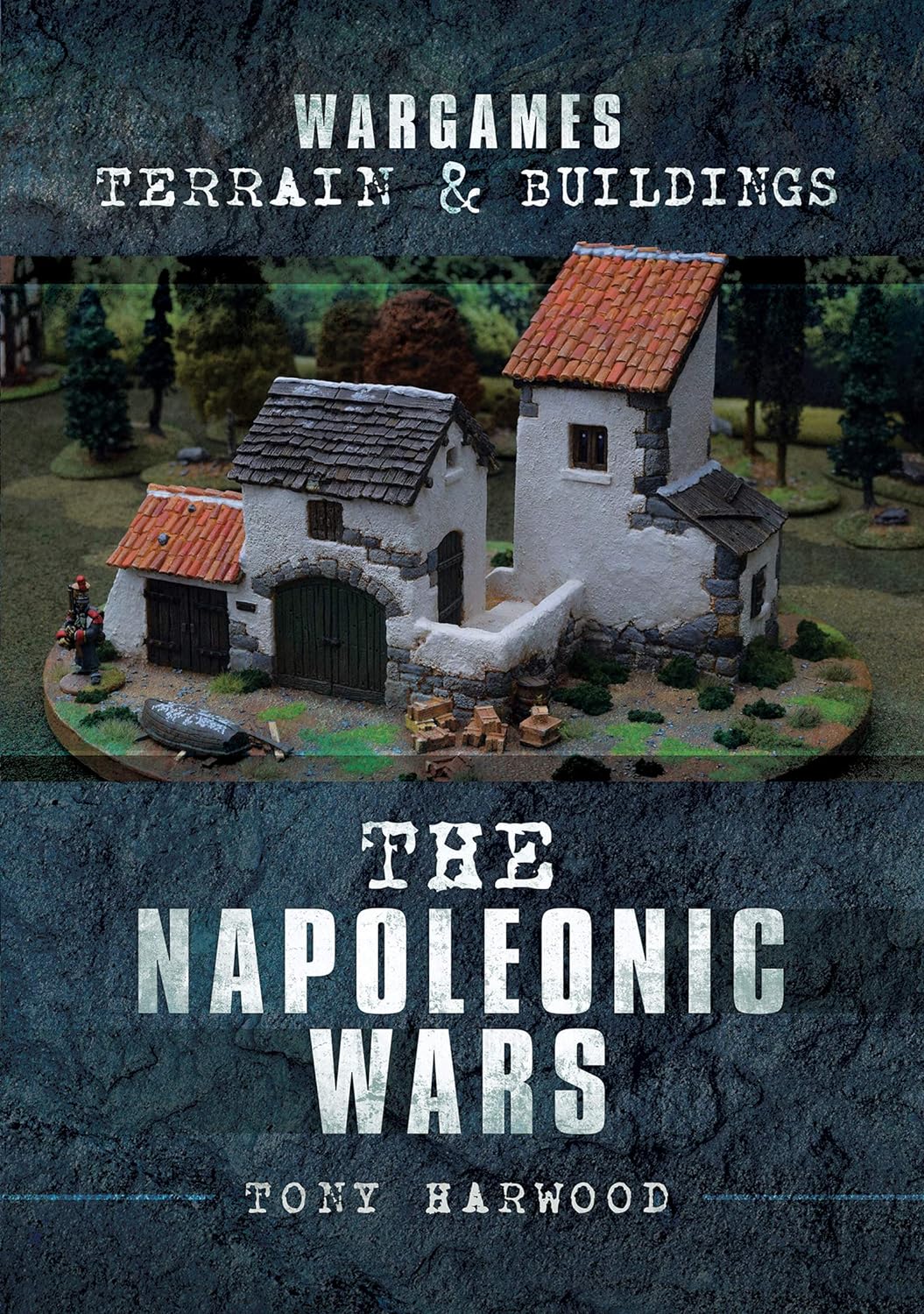Field of Glory Wargaming at The International Wargame Federation Euro Championshships - Rome 2009
Lunch consisted of odd sandwiches and some beer consumed outside ..
"Romanorum imbibo ultum vinum"
Only one more game to endure, sorry, go...
It was also - of course - still very very hot.
This game saw me facing off against some beautiful Venexia Ottomans who's list is available here
The battle started out on my right as my auxilia clung to a steep hill, hoping to sneak round a flank but finding themselves facing some Serbian knights cunningly deployed on a flank.
Yet again woodland terrain had failed to do too much to help, with no pieces in the middle of the park at all.
The Ottomans were pushing forward everywhere, but looked to be planning to skirmish, and had left their Janissaries behind a fortification towards the back of the table, obviously not having yet read the match report from my previous game against the same army...
The initial skirmish quickly escalated, as my auxilia, charging some Ottoman light horse, found themselves marooned in no-mans land after rolling long on a VMD, and were then clobbered in short order by Ottoman Quakapulu cavalry! This then sucked more Romans and Ottomans into the fight, as each side sought to shore up the position...
The Quakapulu then suffered a similar fate, pursuing the eliminated Auxilia
into another unit which had not yet left the safety of the hill. Caesar himself
was looking on as a flank presented itself to his personal legion.
This unequal exchange soon was balanced up, as the Serbian Knights then joined in - as the Quakapulu were teetering on the brink of defeat, the legions had to brace for impact from the knights!
The legion stood fast, and as the Quakapulu were pursued off into the distance by the somewhat battered auxilia, the position of the Serbs became increasingly untenable as they bounced off the legion.
Elsewhere, in the center, the Ottomans were holding up the red advance bravely, but sheer weight of numbers was starting to count against them as Romans flooded in from all sides.
With Roman light horse roaming at will, the brave Ottoman nobility found it increasingly difficult to escape ...
Whilst all this was happening elsewhere, 2 units of handgunners wee giving large numbers of auxilia the run-around as they - like the skythians in the morning - proved utterly impossible to catch. The Romans kept having to pull units out of the advance to rest and repair them...
As the shadows lengthened the battered Ottoman cavalry were subject to the indignity of a charge by Roman light horse (with legionary overlap support) as the Romans sought to sweep them from the field.
As the Romans piled forwards into the shadows (to get out of the sun as much as to get at the Ottomans) the Janissaries finally decided that it was time to join in the fight, and clambered over the wall to try and get at their would-be assailants....
The auxilia were the first to try their luck - rather isolated, but fighting seemed a better option than standing and being shredded by bowfire whilst the reserved ambled up .
And reserved were coming from all directions, pausing only momentarily to
destroy another unit of Ottoman cavalry in their way.
The legions pushed on, as the increasingly beleaguered Ottomans clawed desperately at the edge of the table trying to hang in the game.
But finally, weight of numbers counted, and the Ottomans succumbed to a flurry of legionary pila... a crushing victory for the Romans.
In the end, this was just enough to capture the lead from the other Ottoman army and the Skythians, and springboard the Dom Roms to another championship victory!!
Caesars Post Match Summary
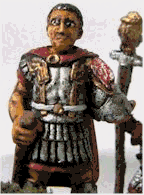 As
Caesar, I am utterly delighted to accept this trophy on behalf of my army -
well, those of them who survived anyway.
As
Caesar, I am utterly delighted to accept this trophy on behalf of my army -
well, those of them who survived anyway.
The combination of large numbers of units, high maneuverability, armour to protect ourselves from archery, and my Inspired Commander's Bulletproof Shield of Magical Powers covering many of my troops was enough to allow us to beat almost every army that was put in front of us.
The secret in most cases was a combination of the extreme toughness of the Superior legions who could survive the occasional disruption and be rescued as their fighting power was only marginally diminished - unlike those rubbishy spears that the effeminate Greeks used to use. This I put down to the Legions being armed mostly with the wonder-weapons of "light spear" (which counts as a POA in all circumstances), and "swordsmen" (again, counting nearly all the time), plus another "armour". A 6 strong legion can stand u pto a knightly charge - how good is that??
The rear rank bowmen were also excellent value, even though their shooting at impact was usually pathetic. They did allow me to create multiple 6-strong units far more cheaply than if the units had been all Legions, and as the bowmen counted the same POAs as the front rankers and "rounded up" in combat it meant that the first base loss in each combat was replaced almost for "free", as well as boosting the break point of the stubborn legions as well.
The fast moving auxilia also managed to create at least 1 or 2 flank attacks in every game we fought, and in a game where the value of a +1 POA advantage is fairly marginal, the importance of the ++/-- AND cohesion drop of a flank attack cannot be underestimated. They achieved this partly through speed and maneuver (the "move and then turn 90" being particularly obscenely good in this respect) but also because with 15 units of which 11 were properly combat-capable I usually found myself with spare units once I'd matched up against the opponent 1-for-1.
The skirmishers and bowmen were far more patchy, and their superiority rarely counted for much - not having swordsmen skills was a far bigger handicap, although it did mean I kept them out of combat quite ruthlessly, thus not losing them that often.
The terrain, despite dictating it in most games, was pretty rubbish, with most of it seeming to fall on the base edges or be moved out of the way by my opponents. The only times it played a major part were in games where so much fell on my opponents base edge it game them problems in fitting all their troops in!
Anyways, a good outing to Europe in terms of trophies, and at least with 5 Superior legions, limited numbers of support troops and only 6 auxilia this particular Dom Rom pseudo-swarm is not as Morally Bankrupt as the Classic Dom Rom Swarm.
Now, the only challenge is to try and find an army out of all the other troops in the draw that is as effective as this one....
Hannibal's Post Match Analysis
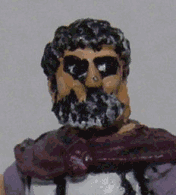 Bloody
Hell? You Won?
Bloody
Hell? You Won?
What a shocking result! And using Romans as well!
I think this is little more than a blatant insult to all that I and my country of Carthage stands for, and all the advice that I have so benevolently and constructively offered you over the years
Now that you have actually won a competition I look back on my career and regret even more not crushing Rome and its empire when I had the chance. Not for the Glory and honour, not just to have recorded a victory more impressive than your achievement here, and not even for the loot.
No, I wish I had crushed Rome so my troops could have erased from the pages of history, stone by stone, the very field of battle on which you would then go on some 2,300 years later to win this rather shocking and probably undeserved victory.
I would like to congratulate you, but embarrassment forbids me
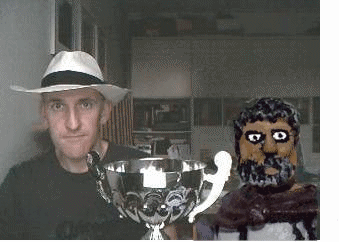
I hope normal service is resumed in the next competition
The Ancient Army List Index
The Rise of Rome (280 BC to 25 BC) Mid Republican Roman ; Late Republican Roman ; Gallic ; Pyrrhic ; Later Carthaginian ; Ancient Spanish ; Later Macedonian ; Later Seleucid ; Later Ptolemaic ; Attalid Pergamene ; Numidian or early Moorish ; Pontic ; Early Armenian ; Parthian ; Later Jewish ; Illyrian ; Spartacus Slave Revolt ; Bosporan ;
Storm of Arrows - Western Europe in the Later Middle Ages (1300 AD to 1500 AD) Medieval French ; 100-yrs War English (Continental) ; 100-yrs War English (Britain) ; Later Medieval Scots ( Britain) ; Later Medieval Scots (Continental) ; Later Scots Isles & Highlands ; Medieval Welsh ; Later Anglo-Irish ; Medieval Irish ; Low Countries ; Later Medieval German ; Italian Condotta ; Swiss ; Free Company ; Medieval Burgundian ; Medieval Danish ; Medieval Swedish ; Medieval Castilian ; Medieval Crown of Aragon ; Medieval Portugese ; Later Granadine ; Navarrese ; Ordonnance French ; Wars of the Roses English ; Ordonnance Burgundian ; Santa Hermandad Nueva Castilian
Immortal Fire - The Greek, Persian & Macedonian Wars (550 BC - 146 BC)
Classical Greek ;
Early Achaemenid Persian ;
Lydian ;
Thracian ;
Syracusan ;
Early Carthaginian ;
Skythian or Saka ;
Kyrenean Greek ;
Late Dynastic Egyptian ;
Alexandrian Macedonian ;
Later Achaemenid Persian ;
Classical Indian ;
Early Successor ;
Early Sarmatian ;
Galatian ;
Hellenistic Greek ;
Graeco-Bactrian ;
Graeco-Indian ;
Indo-Greek :
Legions Triumphant - Imperial Rome (25 BC to 493 AD) Dominate Roman ; Principate Roman ; Foederate Roman ; Later Sarmatian ; Early German ; Dacian or Carpi ; Ancient British ; Caledonian ; Early Alan ; Jewish Revolt ; Sassanid Persian ; Kushan or Indo-Skythian ; Palmyran ; Early Frankish, Alamanni, Burgundi, Limigantes, Rugian, Suevi or Turcilingi ; Western Hunnic ; Early Visigothic & Early Vandal ; Early Ostrogothic, Herul, Sciri or Taifali ; Early Anglo-Saxon, Bavarian, Frisian, Old Saxon or Thuringian ; Gepid or Early Lombard ; Early Scots Irish ; Early Pictish ; Hephthalite Hunnic ;
Swords & Scimitars - The Crusades (1096 AD to 1311 AD) Early Crusader ; Later Crusader ; Fatimid Egyptian ; Georgian ; Seljuk Turk ; Cuman ; Komnenan Byzantine ; Post Latin Conquest Byzantine ; Ilkhanid Mongol ; Mamluk Egyptian ; Cilician Armenian ; Syrian States ; Khwarazmian ; Ayyubid Egyptian ; Middle Serbian ; Middle Bulgarian ; Medieval Cypriot ; Latin Greece ; Pecheneg ;
Eternal Empire - Eastern Europe and the Rise of the Ottomans (1300 AD to 1500 AD) Early Ottoman Turkish ; Later Ottoman Turkish ; Tatar ; Later Russian ; Later Serbian Empire ; Later Bulgarian ; Later Lithuanian ; Later Polish ; Later Teutonic Knights ; Catalan Company ; Middle Hungarian ; Moldavian or Wallachian ; Albanian ; Timurid, White Sheep Turcoman or Black Sheep Turcoman ; Later Hungarian ; Hussite ;
Decline & Fall - Byzantium and Islam (493 AD to 1071 AD) Early Byzantine; Maurikian Byzantine ; Thematic Byzantine ; Nikephorian Byzantine ; Later Moorish ; Later Visigothic ; African Vandal ; Italian Ostrogothic ; Early South Slav ; Lombard ; Avar ; Arab Conquest ; Early Bulgar ; Ummayad Arab ; Abbasid Arab ; Early North African Dynasties ; Khurasanian Dynasties ; Bedouin Dynasties ; Dailami Dynasties ; Pecheneg ; Ghaznavid ; Western Turkish (includes Khazar);
Wolves From The Sea - The Hairy European Dark Ages Post Roman British ; Early Welsh ; Later Scots Irish ; Merovingian Frankish ; Later Pictish ; Early Slavic ; Middle Anglo Saxon ; Astur Leonese ; Andalusian ; Early Navarrese ; Carolingian Frankish ; Viking ; Magyar ; Great Moravian ; Early Scots ; Rus ; Norse Irish ; Early Medieval French ; Early Medieval German ; Norman ; Early Polish ; Anglo Danish ;
Swifter Than Eagles - The Biblical Book Nubian ; Early Libyan ; Later Sumerian or Akkadian ; Early Nomad Allies ; Old or Middle Kingdom Egyptian ; Hyksos ; Mitanni ; Syro-Canaanite ; New Kingdom Egyptian ; Later Minoan or Early Mycenaean ; Hittite Empire ; ; Middle or Early Neo-Assyrian ; Later Mycenaean or Trojan ; Sea Peoples ; Philistine ; Phoenician Allies ; Neo-Hittite And Aramaean ; Later Hebrew ; Mannaean Allies ; Libyan Egyptian ; Urartian ; Median ; Neo-Elamite ; Proto-Arab Allies ; Cimmerian or Early Skythian ; Neo-Assyrian Empire ; Phrygian Allies ; Kushite Egyptian ; Neo-Babylonian Empire ;
Oaf of Fealty - Early Medieval Europe Feudal Catalan and Early Crown Of Aragon ; Early Hungarian ; Taifa Andalusian ; Feudal Navarrese and Aragonese ; Feudal Castilian Leonese or Portuguese ; Fanatic Berber ; Italo-Norman ; Feudal French ; Imperial German ; Feudal German ; Communal Italian ; Papal Italian ; Early Scots Isles And Highlands ; Feudal Scots ; Early Russian ; Feudal Polish ; Anglo-Norman ; Later Welsh ; Early Lithuanian or Samogitian ; Wendish Prussian or Estonian ; Early Medieval Frisia and Other Free Cantons ; Post-Viking Scandinavian ; Early Plantagenet English ; Later Sicilian ; Early Medieval Irish ; Early Anglo-Irish ; Early Teutonic Knights ; Mongol Invasion ; Early Granadine ; Middle Plantagenet English ;
Empires of The Dragon - China, Korea and Japan Erlitou-Shang Chinese ; Early Northern Barbarian Allies ; Early Zhou Chinese ; Yayoi Japanese ; Early Horse Nomad ; Ko Choson Korean ; Warring States To Western Han Chinese ; Qiang And Di ; Three Kingdoms Korean ; Eastern Han Chinese? ; Three Kingdoms W Jin And S Dynasties Chinese ; Kofun Nara Japanese ; Northern Dynasties Chinese ; Later Hindu North Indian ; Later Hindu South Indian ; Central Asian City States ; Western Wei To Early Tang Chinese ; ; Later Horse Nomad ; Tibetan ; Nepalese Allies ; Parhae Korean ; Late Tang To Five Dynasties Chinese ; Khmer Or Champa ; Thai Allies ; Nanzhao ; Pyu Burmese Allies ; Koryo Korean ; Early Heian Japanese ; Pagan Burmese ; Liao ; Song Chinese ; Xi Xia ; Ghurid Afghan ; Jin ; Late Heian To Muromachi Japanese ; Japanese Warrior Monk Allies ; Mongol Conquest ; Moslem Indian Sultanates ; Medieval Indonesian Or Malay ; Yuan Chinese ; Medieval Burmese ; Ming Chinese ; Yi Korean
Blood and Gold - The Americas Olmec ; Teotihuacan ; West Mexican ; Zapotec or Mixtec ; Toltec ; Chinantec ; Aztec ; Tarascan ; Tlaxcalan Confederacy ; Mayan ; Mochica ; Chanca ; Chimu ; Hatun-Colla ; Canari ; Inca ; Mapuche or Araucanian ; Amazonian Forest Tribes ; Tupi ; Chichimec ; Pueblo Culture ; Mound-Builder Culture ; South-Eastern Woodland Culture ; Timucuan ; Eastern Woodland Culture ; Plains Culture ; Pacific North-West Culture
View My Stats for My FoG Pages
